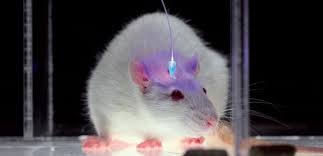The Era of Memory Engineering has Arrived
 “We allow that our memories may fade and fail a bit, but otherwise, we go on the sanity-preserving assumption that there is one reason why we remember a particular thing: because we were there, and it actually happened. Now, a new set of experiments, led by MIT neuroscientists Steve Ramirez and Xu Liu in Susumu Tonegawa’s lab, shows that this needn’t be the case. Using a stunning set of molecular neuroscience techniques (no electrode caps involved), these scientists have captured specific memories in mice, altered them, and shown that the mice behave in accord with these new, false, implanted memories. The era of memory engineering is upon us, and naturally, there are big implications for basic science and, perhaps someday, human health and society…
“We allow that our memories may fade and fail a bit, but otherwise, we go on the sanity-preserving assumption that there is one reason why we remember a particular thing: because we were there, and it actually happened. Now, a new set of experiments, led by MIT neuroscientists Steve Ramirez and Xu Liu in Susumu Tonegawa’s lab, shows that this needn’t be the case. Using a stunning set of molecular neuroscience techniques (no electrode caps involved), these scientists have captured specific memories in mice, altered them, and shown that the mice behave in accord with these new, false, implanted memories. The era of memory engineering is upon us, and naturally, there are big implications for basic science and, perhaps someday, human health and society…
…Naturally, one wonders whether these techniques might someday find human applications. Perhaps it would be possible to rebuild particularly cherished and important memories that have deteriorated with age or disease? Or perhaps, more provocatively, some might even embrace the idea of falsified memory – artificially adding in happiness where there is only remembered pain, or subtracting out enduring despair that’s long outlived its usefulness.  These are some ethically tricky situations, to be sure. At the same time, though, it’s hard to not sympathize with someone, say a war veteran or a rape victim, who might want the emotional content of a specific, life-destroying memory modified.”
These are some ethically tricky situations, to be sure. At the same time, though, it’s hard to not sympathize with someone, say a war veteran or a rape victim, who might want the emotional content of a specific, life-destroying memory modified.”












